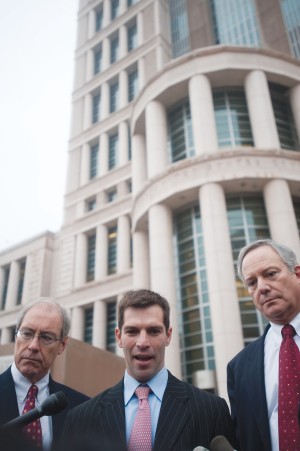Politics
Smith draws inspiration from prison stay
Former state senator Jeff Smith, flanked by his lawyers, speaks to the media after being sentenced to 12 months in federal prison and a $50,000 fine in November 2009. Smith plead guity to two counts of conspiracy to obstruct justice.
Smith handwrote the majority of the book in a journal he kept while serving time for lying to federal investigators who were looking into his campaign activities from his 2004 congressional bid.
In his book, tentatively titled “Mr. Smith Goes to Prison: What They Don’t Teach in PoliSci 101,” Smith aims to point out how his political science degrees have helped him in his legislative tenure and throughout his life, and discuss ways in which he thinks they are lacking.
“I would say there’s a healthy dose of analysis [in my book] of places where scholarly theory comports with reality that I encountered or does not,” Smith said. “In a lot of cases, it kind of falls short.”
According to Smith, many academic programs are so heavily focused on scholarly theory that they often fail to fully prepare students for the practice of politics.
“[In my book, I discuss] places where academic theory is often insufficient to explain a lot of the phenomena that I encountered,” he said. “A lot of political science theory and theories about the legislative process are pretty mathematical and don’t always account for emotion and relationships, and those are…two very, very important factors that often are not included in models.”
Writing a book, Smith said, has long been a personal objective. He hopes that his work will help to inform and improve the field and practice of politics.
“I’ve always hoped to try to alert practitioners to the fact that there is a lot of wisdom that they can draw upon in political science,” Smith said. “I’ve also tried very hard to bring different aspects of real world politics to academia, which conversely, I think, helps inform the work of scholars. So one of the main goals of the book is to try to help the two worlds speak to each other.”
Smith submitted a false affidavit to the Federal Election Commission while under investigation. In the affidavit, Smith denied involvement in the production of illegal negative advertisements distributed about Russ Carnahan—Smith’s opponent in the 2004 U.S. House of Representatives race, to whom Smith lost.
He also hopes to share his story with young people—especially those interested in politics, who might learn from his mistakes.
“I spent over a decade involved in community service in St. Louis and then public service,” Smith said. “And because of a mistake that was pretty needless—and ultimately didn’t make a difference in the election that I was running—I made a mistake in the heat of a campaign that really undid a lot of the good I had worked to accomplish.”
In his experience, Smith has found that small choices and judgment calls really do matter.
“In the original mistake, the spotlight wasn’t on at all. It was a five-minute conversation in the middle of a campaign that no one was really paying attention to at that time,” he said. “It was in a time before the spotlight was on me, in a time before I realized that it would come back to haunt me, was when I originally slipped up. It’s things that you do when you might least expect it that can ultimately come back and unravel a lot of the things that you had worked for.”
Smith hopes that the significant press his story has garnered will allow his message to be heard.
In fall of 2009, Smith pled guilty on two felony counts of conspiracy to obstruct justice. He was convicted, sentenced to a year and a day in a Kentucky prison, and fined $50,000. Smith was released to a St. Louis halfway house in August 2010, where he stayed until November 2010.
So far, the former state senator has written about 400 pages, and he says the book is almost complete. His agent has been pitching to publishers and hopes that the book will be available for sale by late 2011 or early 2012.
Senior Grady Jung remembers hearing about the controversy in 2009 and thinks the book will provide a uniquely beneficial view.
“There are a lot of not-kosher things in politics, and to get the perspective of someone who was actually prosecuted for that—I think that would be a really valuable view,” Jung said.
Other students agree that Smith’s experiences make his viewpoint valuable.
“It will definitely offer an interesting perspective. People already think there’s so much corruption in government; [now] they can hear the story from someone who has actually gone through it and been a part of it,” freshman Robert Knapel said.
Since Smith regained his freedom, he has been working on various projects, helping to write part of the city’s bid for the Democratic National Convention and doing consulting work. He has also written for “The Recovering Politician” blog and will soon begin contributing to The Huffington Post, focusing on urban education and federal budget issues.
Smith has also interviewed for several professorships in various locations around the country. In 2002, he won Washington University’s Dean’s Award for Teaching Excellence.
“I loved the experience I had teaching at Wash. U.,” Smith said. “I just came back last week and guest lectured for a friend who teaches a public policy course, and it reminded me of how much I love teaching and being around young people who are interested in public policy, so hopefully I’ll have the chance to do that again.”

